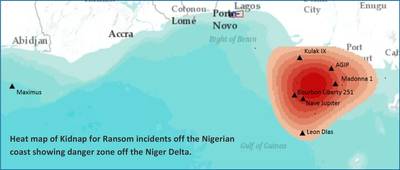While the matter of maritime piracy has seemingly subdued from its high profile peaks of a few years ago, Stuart Edmonston, Head of Loss Prevention at UK P&I Club, together with Hellenic War Risks and Terra Firma Risk Management, highlight the growth of piracy in the Gulf of Guinea and considers the reasons behind the rise in kidnaps for ransom.
“The Gulf of Guinea is understood to be the most dangerous region in the world for seafarers. A report by Oceans Beyond Piracy* revealed that there have been 32 kidnaps for ransom during 2016 in the Gulf of Guinea, surpassing the total number of incidents, 19, recorded by the International Maritime Bureau (IMB) for 2015.
“The IMB itself has recorded 10 incidents in the Gulf of Guinea in the first quarter of 2016, and the kidnap of 16 seafarers**. Since April 2015, the Merchant Trade Information Sharing Centre for the Gulf of Guinea (MTISC-GoG) recorded 56 incidents in the area and the kidnap of 35 seafarers.
“The increase in kidnapping for ransom has not occurred out of the blue: in 2014, 16% of attacks in the area involved kidnap for ransom; in 2015 it was 28% of attacks. There may be two reasons why kidnapping has increased in late 2015 and has continued to increase in 2016.
“Improved naval patrolling (by the Nigerian and other littoral navies) may have made cargo theft more difficult and dangerous. Cargo theft, particularly of large amounts of refined oil products, takes time and so criminals have moved to a crime where less time is spent on-board vessels and leaves them less exposed to naval patrols, i.e. the kidnap for ransom of ships’ crews.
“In addition, it may be that for the time being, the drop in oil prices has made oil theft a less lucrative proposition than kidnapping for ransom.
“There are indications that some kidnappers have such belief in their business model that they are increasing their logistical capacity to take in and hold more hostages, possibly for longer than is now normally the case. There are also signs that their understanding of the ‘kidnap market’ is evolving – in other words, they may be able to target their attacks with greater precision and demand higher ransoms.
“The costs of protecting vessels in the region are well known and the threat of kidnap in the Gulf of Guinea is unlikely to disappear or decrease significantly in the next year or so. Consequently, attacks on vessels and the kidnapping of seafarers in the region may have a further impact on business. Owners and crewing agencies may find it increasingly hard to crew ships in these waters, especially with nationalities that have the appropriate experience, languages and skills set.
“Shipping companies need not only to protect their vessels, but also to ensure that they can still attract high-quality officers and crews willing to sail in the area. This means that crews must understand, but not overestimate, the risks and that they and their families are mentally and physically prepared for an incident. Companies must also be able to demonstrate that they take their duty of care seriously, and that they will be able to act professionally if a kidnap does occur.”
** ICC – IMB Piracy and Armed Robbery Against Ships Report – First Quarter 2016















